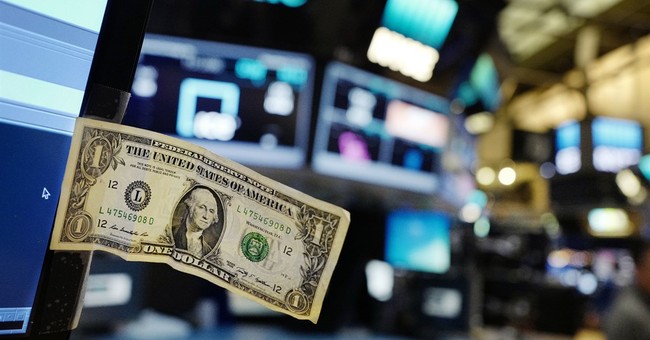
Posted on 05/22/2019 2:57:48 AM PDT by Kaslin

Look at the dollar bills in your wallet. They say they are "legal tender for all debts."
But are they? What makes them valuable? What makes them worth anything?
Each bill says, "In God We Trust." But God won't guarantee their value.
The $20 bill depicts the White House. Congress is on $50s. But neither guarantees the value of our dollars.
I wouldn't trust them if they did. I don't trust politicians, generally, but I especially don't trust them with money. Since President Richard Nixon took the U.S. off the gold standard, the dollar has lost 80 percent of its value.
So what makes money trustworthy?
A new PBS documentary, "In Money We Trust?" points out that money is only useful if people agree that it can be trusted.
I made a short version of the documentary.
To earn trust, money should be "reliable, like a clock," says Forbes magazine publisher Steve Forbes. "It has to be fixed in value: 60 minutes in an hour, 60 seconds in a minute. Imagine if that floated each day. That would make life chaotic."
Throughout history, people needed a way to assign a fixed value to money.
"The best mechanism for this would be some kind of commodity that's permanent, easily transported, easily understood by everyone. And that medium was, of course, gold," says anthropologist Jack Weatherford in the documentary.
But gold isn't the only thing to which people have pegged the value of money. They've also linked it to things such as silver, crops and salt. Salt-based trade is where we got the word "salary."
But gold created "a kind of mobility in people's lives that they never had before," says Weatherford.
But gold is heavy -- hard to carry around. That limited trade.
So people created banks.
"The Knights Templar developed a system where they said, 'Well, you can just deposit your money here with us and then, when you need some, withdraw it from your account,'" explains economist Nathan Lewis. "This enabled the peasants to travel Europe without being in danger of being robbed."
That meant people could engage in more trade.
"You could ... sell a bond in London," says Lewis, "and build a railroad in India."
The increased trade made the world much richer.
In the United States, the first secretary of the treasury, Alexander Hamilton, fixed the dollar to gold and silver. The whole world came to trust the dollar as a reliable indicator of value.
But governments like to enrich themselves by debasing currency, making it appear the government has more wealth than it really does -- spreading the same wealth over more units of currency.
The evil emperor Nero did it in ancient Rome, says Weatherford. "They would call in all the coins, melt them down, reissue them -- of course, with his picture on them," but with less gold in each coin. Rome's decline was tied to the decrease in the trustworthiness of its currency.
"When you change the value of money, you're stealing property," says Forbes.
That happened in Germany after World War I. The victorious nations demanded that Germany pay for the cost of the war. So, Germany just printed more bills. That created massive inflation. That inflation helped elect Hitler.
Governments rarely resist the temptation to print more currency.
During the Great Depression, Franklin Roosevelt confiscated private supplies of gold.
Without a clear legal peg of each dollar to a specific amount of gold, the government could print more currency. That only added to the financial instability.
After World War II, governments returned to gold-based currency. "Those two decades," says Lewis, "were the most successful economically of any time."
The documentary argues that a return to the gold standard is what's needed to have reliable money.
Today, most economists disagree.
But "In Money We Trust?" will give you a new appreciation for how important it is that we get this right.
As technologist George Gilder concludes in the documentary, "All this is the struggle for trust."
Understandable; it just isn’t universal.
Good point; when countries “re-evaluate” their currencies, their people see their cash lose value quickly. I remember years ago when Argentina did it; they had a “bank holiday” where they were closed, but some enterprising people figured out that they could get money out in casinos in Uruguay - so they could spend the soon-to-be-devalued money in their bank accounts before it was decided that it was worth half as much/could only buy half as much.
Here’s another thought to add to the mix. Gold, salt, silver, wampum, paper - all used at one time or another as a medium of exchange and store of value - have no worth unless, plain, old-fashioned WORK is associated with them.
If no one ever accomplishes productive enterprise, what’s the use of money?
I don’t know about that; they are a medium of exchange - and probably paid for the world’s “oldest profession”...
Hmmm. Don’t know if that would qualify as “work,” but it’s definitely human activity that accomplishes something.
Back then it bought people.
Disclaimer: Opinions posted on Free Republic are those of the individual posters and do not necessarily represent the opinion of Free Republic or its management. All materials posted herein are protected by copyright law and the exemption for fair use of copyrighted works.